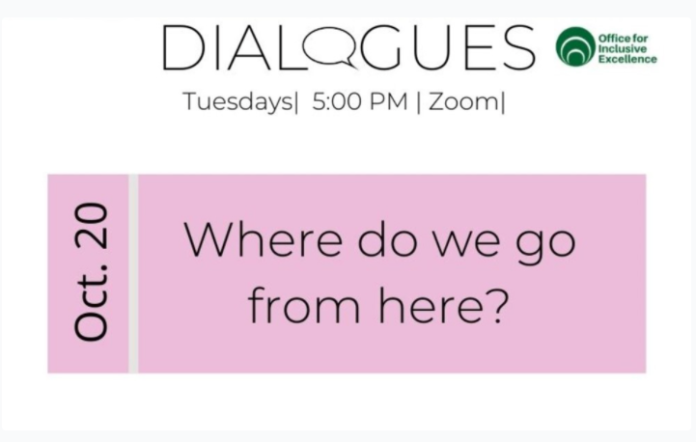The final session of Diversity Dialogues for the fall semester invited students and faculty to discuss “Where Do We Go From Here,” a topic focused on forward movements on an individual, community and national level.
The Diversity Dialogues are sponsored by the Office for Inclusive Excellence (OIE).
Keisha Booker, the assistant director of multicultural development, and Kemoni Farmer, the graduate assistant for multicultural development, facilitated the event.
The session began by giving participants the opportunity to chose which breakout room they would like to be placed in. The breakout rooms were based on each of the previous Diversity Dialogues: “Women in Today’s World,” “Oppression and Privilege,” “Voices Behind the Movement,” “Transgender Inclusion,” and “Religion and Spirituality.” In these rooms, participants would discuss how each of these topics can be addressed on an individual, community and national level.
A majority of the groups expressed education and research on the individual level, but ideas changed the broader the levels got.
For “Voices Behind the Movement,” the idea of recognizing the original founder of the movement was discussed for the national level.
“National can be there to support local on a level,” participant A said. “It comes down to the people who are in charge of the organization. I feel a lot of movements take on their own identity, not one that the founder would have personally wanted.”
In regards to other topics, such as “Oppression and Privilege,” participants said that a lot of the forward movement can be based on creating a conversation and recognizing one’s bias in order to progress on a wider scale for all groups.
“It’s self education, too,” participant B said. “Just like this week, I found out that indigenous people don’t prefer the term Native American, they prefer indigenous people or being referred to by their tribe name.”
Creating a dialogue to decrease bias and increase understanding is something that all participants agreed the Diversity Dialogues had begun to do.
For other topics, such as “Women in Today’s World,” there were more physical things that could be done on a community and national level, such as reaching out and volunteering at women’s shelters or recognizing women in places of power.
Similarly for “Transgender Inclusion,” recognizing and being mindful of how transgender can impact specific fields and using litigation against discrimination by protecting individuals can be done on all three levels.
“We talked about how you have to break your own boundaries and step out of the box,” participant C said.
Stepping out of the box related back to the final topic of “Religion and Spirituality.” On the community level, schools can have different classes for religion or a specific class dedicated to religion. While on a national level, religions can stream their services, such as churches streaming theirs. An idea of a national level religious panel was also mentioned.
Although the idea of forward movements is something the participants were passionate about, it was recognized that the steps may also be difficult.
“I always find that I can’t do any kind of forward movement if I am not okay,” participant D said.
To help internal forward movement, the facilitators offered ideas such as educating through books or documentaries, talking to people affected by causes one is passionate about, getting a mentor, and having a different array of places to learn from.
Moving from internal onto local, the facilitators mentioned various ways to volunteer, performing random acts of kindness, attending community meetings, shopping local and donating to local schools and community shelters.
Nationally, those wanting to become involved in forward movement can vote, support a process or a cause, raise awareness through advocacy and storytelling, organize marches or protests, donate to causes one supports and lobbying, protesting or writing letters to the government.
“We broke into small groups and talked about ways to move forward,” participant D said. “We don’t want your conversations to stop. What types of things in your current reality would have to change in order to make that goal a reality?”
A large aspect of what the participants said that was holding them back focused on being afraid to have a voice or something more of the internal aspect.
“For me, your own mind is stopping you,” participant E said. “There are a couple times I was like ‘Oh I want to go to this protest,’ but my mind came up with all these reasons not to. It’s pushing past that to create change.”
Leading into the second discussion question, participants were asked “what would you have to let go to create that change you are looking for?”
Similarly to internal thoughts holding some participants back, it was letting go of their internal thoughts to create change.
“You would have to let go of that selfish and inner thought that if it doesn’t apply to me then it isn’t important, so you can take that step to educate yourself about specific issues,” participant F said.
Other suggestions were letting go of relationships or prior experiences to move forward, or leaving ones hometown to travel some place more diverse.
As always, the end of the Diversity Dialogues translate into specifically something the campus can do, participants were asked “what would the university look like if we had mastered certain aspects of diversity and inclusion?”
A majority of the participants said that there would be a variety of different events and recognition such as various clubs and organizations with open and honest communication between the groups.
“If we were the most diverse that we could be, the atmosphere would change to be more comfortable and everyone feels like they could be themselves without judgement,” Participant G said.
It was acknowledged that there are always areas of growth for diversity and inclusion, but the university is making strides towards it.
Although the final Diversity Dialogue took place Tuesday, the discussion will continue in the Spring 2021 semester around March or April.








